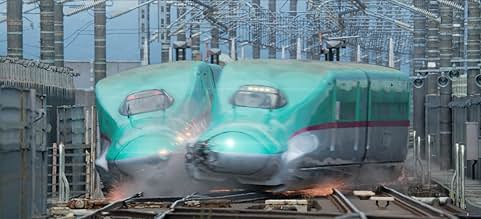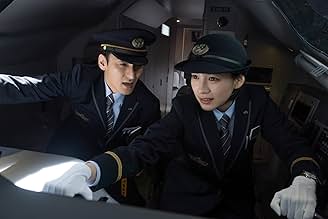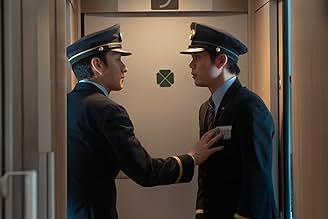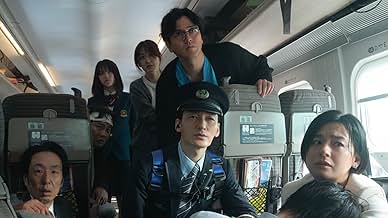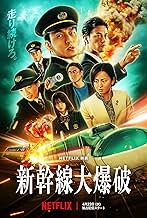AVALIAÇÃO DA IMDb
6,2/10
7,3 mil
SUA AVALIAÇÃO
Um grupo amarra bombas em um trem-bala japonês na tentativa de extorquir dinheiro do governo.Um grupo amarra bombas em um trem-bala japonês na tentativa de extorquir dinheiro do governo.Um grupo amarra bombas em um trem-bala japonês na tentativa de extorquir dinheiro do governo.
- Direção
- Roteiristas
- Artistas
Avaliações em destaque
Critics are dumb for comparing this with Speed (1994). This is a sequel to the movie Bullet Train (1975).
Besides the explosion plot, the stories are entirely different.
Overall, this was an enjoyable action film, made for the big screen, with clever scenes and twists.
It brings new ideas to the "train" disaster genre, which are much appreciated and make everything engaging.
The performance of the main leads is solid.
Despite a few plot holes and some slightly bad acting in supporting roles, the movie carries a great intensity that keeps you hooked from the beginning to the end.
If you enjoy train movies, you will like this!
Besides the explosion plot, the stories are entirely different.
Overall, this was an enjoyable action film, made for the big screen, with clever scenes and twists.
It brings new ideas to the "train" disaster genre, which are much appreciated and make everything engaging.
The performance of the main leads is solid.
Despite a few plot holes and some slightly bad acting in supporting roles, the movie carries a great intensity that keeps you hooked from the beginning to the end.
If you enjoy train movies, you will like this!
An affectionate and well-realised update of Junya Sato's The Bullet Train, Bullet Train Explosion's devotion to delivering relentless edge-of-your-seat thrills ensures it's a blast from the moment it leaves the station. After his masterful reworking of Ultraman 3 years ago, I've been patiently waiting for Shinji Higuchi's next film. While the visual effects, direction, cinematography and camerawork are all top-notch, the carnage feels relatively restrained compared to Higuchi's prior work. However, even then, the film's greatest strength lies in its construction of tension and its commitment to showing how people respond to chaos. Some rise while others fall. Even with Higuchi as the film's conductor, this is still very much a one-track film, where Sato's original cross-cuts the action on board its Shinkansen with Ken Takakura's criminal antics, and here we are solely dedicated to the action on board. Despite its familiarity, there's also a fair dose of originality, although the late-game villain reveal had me howling with unintentional laughter. It's a long journey, full of near misses and assorted beats of suspense; although it abandons the complicating human factors that gave the original its soul, the film works very effectively as both a remake and a legacy sequel alike, even if the first half is far stronger than its latter half. Backed by strong performances and a rousing score by Taisei Iwasaki, Bullet Train Explosion is an effectively solid action disaster throwback, full of collectivism and collaboration.
"Bullet Train Explosion" is an action movie that feels like they used to make back in the day. It's reminiscent of "Speed" with Bullock and Reeves, but swaps the bus for a runaway train. It's perfect for passing the time lightly and enjoyably. It's not an Oscar-worthy film, but it's pleasant to watch despite its long runtime. The effects are decent, and some actors shine in their roles. That said, when it comes to the big reveal of the villain, you can't help but raise an eyebrow and mutter, "Seriously, that's the bad guy?"-it's a bit of a letdown.
I recommend it to anyone looking for an action flick to enjoy with a side of popcorn.
I recommend it to anyone looking for an action flick to enjoy with a side of popcorn.
With all due respect to my fellow critics-whose insights I genuinely admire-I must gently (but firmly) tap the brakes on this recurring assertion that Bullet Train Explosion is little more than a Japanese Speed. Yes, both films hinge on the same pulse-quickening premise: a vehicle that must maintain velocity or detonate spectacularly. But before we declare Speed the originator of this trope, let's give history its proper due-and a little reverence.
Because long before Keanu Reeves fired off "Pop quiz, BLEEP," and Sandra Bullock white-knuckled her way into action-movie legend, there was The Bullet Train (Shinkansen Daibakuha, 1975). A Japanese thriller that introduced the world to a high-speed train wired to explode if it dipped below a certain speed. Sound familiar? It should. This was the first film to plant a bomb squarely under the concept of velocity. And it was brilliant.
But the lineage doesn't stop there. Even Speed's screenwriter, Graham Yost, credited his inspiration not as some divine spark, but as a cinematic handoff from Runaway Train (1985)-another nail-biter about an unstoppable locomotive hurtling toward oblivion. Here's where it gets even juicier: Runaway Train was originally the brainchild of none other than Akira Kurosawa. Yes, that Kurosawa. The auteur behind Seven Samurai and Rashomon. He wrote the screenplay in the 1960s, envisioning a deeply human, existential thriller set aboard a runaway engine. Though he never got to direct it, his vision survived and roared to life years later under Andrei Konchalovsky.
So let's be clear: Bullet Train Explosion isn't some derivative knockoff trailing behind Speed. It's part of a long, cross-cultural cinematic tradition that spans continents and decades. It stands proudly in a lineage that includes Kurosawa, Konchalovsky, and yes, Jan de Bont. To reduce it to "Speed, but Japanese" is to miss the point-and miss the artistry.
As a Gen-Xer, Speed is sacred to me. It defined a decade of action cinema. It made "mass transit terrorism" an oddly specific genre. And it will always be brilliant. But brilliance doesn't need to be first. And homage is not theft-it's a love letter. Bullet Train Explosion is exactly that: a loud, stylish, blood-soaked valentine to its forebears.
So instead of side-eyeing the similarities, let's celebrate the shared DNA. Let's honor Bullet Train Explosion as a continuation-not a copy-of a global cinematic conversation about speed, stakes, and what happens when you can't stop moving.
With admiration for my fellow Speed disciples (I am one of you), and with cinematic history riding shotgun, I rest my case.
Because long before Keanu Reeves fired off "Pop quiz, BLEEP," and Sandra Bullock white-knuckled her way into action-movie legend, there was The Bullet Train (Shinkansen Daibakuha, 1975). A Japanese thriller that introduced the world to a high-speed train wired to explode if it dipped below a certain speed. Sound familiar? It should. This was the first film to plant a bomb squarely under the concept of velocity. And it was brilliant.
But the lineage doesn't stop there. Even Speed's screenwriter, Graham Yost, credited his inspiration not as some divine spark, but as a cinematic handoff from Runaway Train (1985)-another nail-biter about an unstoppable locomotive hurtling toward oblivion. Here's where it gets even juicier: Runaway Train was originally the brainchild of none other than Akira Kurosawa. Yes, that Kurosawa. The auteur behind Seven Samurai and Rashomon. He wrote the screenplay in the 1960s, envisioning a deeply human, existential thriller set aboard a runaway engine. Though he never got to direct it, his vision survived and roared to life years later under Andrei Konchalovsky.
So let's be clear: Bullet Train Explosion isn't some derivative knockoff trailing behind Speed. It's part of a long, cross-cultural cinematic tradition that spans continents and decades. It stands proudly in a lineage that includes Kurosawa, Konchalovsky, and yes, Jan de Bont. To reduce it to "Speed, but Japanese" is to miss the point-and miss the artistry.
As a Gen-Xer, Speed is sacred to me. It defined a decade of action cinema. It made "mass transit terrorism" an oddly specific genre. And it will always be brilliant. But brilliance doesn't need to be first. And homage is not theft-it's a love letter. Bullet Train Explosion is exactly that: a loud, stylish, blood-soaked valentine to its forebears.
So instead of side-eyeing the similarities, let's celebrate the shared DNA. Let's honor Bullet Train Explosion as a continuation-not a copy-of a global cinematic conversation about speed, stakes, and what happens when you can't stop moving.
With admiration for my fellow Speed disciples (I am one of you), and with cinematic history riding shotgun, I rest my case.
OK so it's over long (losing momentum a bit in the second half), and the villain when revealed is an eye roll that doesn't really make all that much sense. But despite that its a fun and at times tense action / disaster movie, the type of which doesn't get made all that much these days.
The cast are all good, and the sfx are generally good, although they would have benefitted from a slightly higher budget here and there. Some great cinematography too.
I think anyone who likes movies like Unstoppable, Silver Streak, Speed and other similar disaster movies will find much to enjoy in this film.
The cast are all good, and the sfx are generally good, although they would have benefitted from a slightly higher budget here and there. Some great cinematography too.
I think anyone who likes movies like Unstoppable, Silver Streak, Speed and other similar disaster movies will find much to enjoy in this film.
Você sabia?
- CuriosidadesThere is a character named Chiba. Sonny Chiba starred in the original Bullet Train in 1975.
- ConexõesRemake of O Trem Bala (1975)
Principais escolhas
Faça login para avaliar e ver a lista de recomendações personalizadas
Detalhes
- Data de lançamento
- País de origem
- Central de atendimento oficial
- Idioma
- Também conhecido como
- Pánico en el tren bala
- Locações de filme
- Empresas de produção
- Consulte mais créditos da empresa na IMDbPro
- Tempo de duração2 horas 14 minutos
- Cor
- Mixagem de som
- Proporção
- 2.35 : 1
Contribua para esta página
Sugerir uma alteração ou adicionar conteúdo ausente




